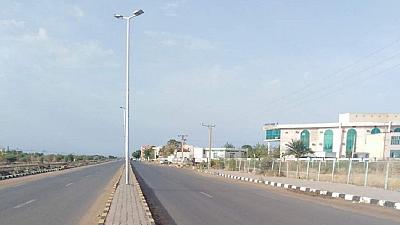June 10: Day Two of social shutdown
Reports indicate that the streets of Sudan’s capital, Khartoum remain largely deserted on Monday, the second day of an indefinite civil disobedience campaign.
Many people heeded the call from protest and opposition groups for civil disobedience and the majority of businesses and offices in the capital, Khartoum are closed despite a few movements unlike on Sunday.
The aim is to force the country’s military leaders to transfer power to a civilian authority. A security operation on Sunday is said to have claimed four lives in and around Khartoum.
Despite the crippling nature of the shutdown, the junta’s spokesperson Gen. Kabbashi is on record as saying all was normal across Sudan.
The state-run television also showed footage suggesting that life was going on as normal in Khartoum but activists pointed out that the said footage was an old one.
https://twitter.com/thomas_m_wilson/status/1137993879339307008?s=19
“The people cannot be governed by force, and I am not saying this neither as a member of the opposition nor as someone who supports the government, but the people do not want this government, and as you can see the streets are empty, shops are closed. I personally want a civilian government,” an anonymous citizen told Reuters.
The strike is in response to a military crackdown on protesters a week ago which left more than 100 people dead, according to opposition groups. The government has put the death toll at 61.
June 9: Civil disobedience takes off
A civil disobedience called by Sudanese protest leaders has taken off across the country according to reports on early Sunday, June 9.
Multiple neighbourhoods of the capital Khartoum have been deserted with very little sign of social life. The presence of security agents is however pronounced, the reports added.
The Forces for Freedom and Change, FFC, an umbrella body for protest groups called for the civil disobedience following a chaotic last week that saw a Khartoum sit-in violently dispersed by special forces.
The measure has also affected air travel at the country’s main airport with travellers stranded. Emirates Airlines has also announced a suspension of all flights to Khartoum till Monday, June 10 citing political unrest.
Meanwhile, a major FCC player, the Sudanese Professionals Association (SPA) has stressed that it will not return to talks with the ruling junta, the Transitional Military Council (TMC) till its demands are met.
As at today, an internet cut that was
imposed mid-week last week continues to be in effect, reports have confirmed. Social media platforms, however, continue to be key in putting out information on ongoings in the country.
A summary of Sudan’s week of deadly chaos and continental concern:
- June 3rd: RSF forces (ex-Janjaweed) forcibly break up Khartoum sit-in
- June 4th: TMC scraps earlier deal with protest group, announces elections in nine months
- June 5th: TMC backtracks on talks, says open to dialogue. Protesters hold out. Eritrea jabs African Union over crisis.
- June 6th: AU suspends Sudan over June 3 crisis, failure to ensure civilian transition. Internet cuts reported
- June 7th: Ethiopia PM Abiy Ahmed meets sides in Khartoum in mediation effort. Protesters call for civil disobedience
- June 8th: Protest leaders reiterate conditions for return to dialogue.
- June 9th: Civil disobedience kicks off.
https://twitter.com/thomas_m_wilson/status/1137452907127812096?s=19

